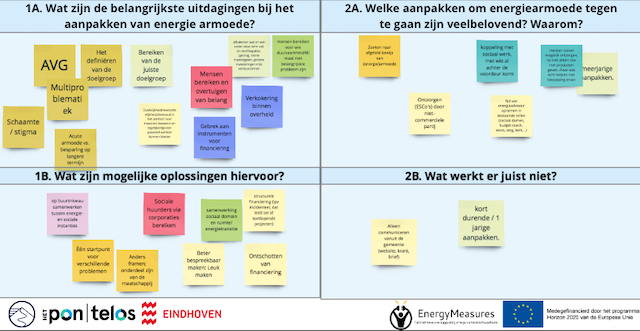In March 2021 the first stakeholder meeting within the EnergyMeasures project took place online, counting 32 participants from various sectors. The aim was to bring participants working at housing corporations, municipalities and other authorities and energy coaches into contact with each other to enable a first exchange regarding the issue at stake – energy poverty and how to address it.
The meeting was organised in an interactive way, dividing participants into small groups to thoroughly discuss the following questions:
What are the main challenges in addressing energy poverty? And what are possible solutions?
Which approaches to combat energy poverty are promising? What exactly does not work? The groups achieved great results that were shared via the online tool Miro, a digital white board to which participants were able to virtually stick their notes and thoughts.
In regard to the first question, many participants mentioned that the greatest challenges lie in reaching households living in energy poverty and communicating with them. Reaching people living in energy poverty is experienced as difficult, partly because there is a shame or stigma on poverty. It is a challenge for care providers to create the trust of people and to convince them to request help. Furthermore, the challenges also lie in tackling energy poverty. The approach to energy poverty is a long-term process, requiring a structural and long-term approach. This is not only a challenge for aid workers, but also for subsidies from the government. These subsidies often do not have such a long-term character, which makes it difficult to design the programs accordingly.
Regarding the second question it became apparent, that since energy poor households often face complex problems, offering multiple approaches is seen as promising. When reaching low-energy households and getting ‘behind the front door’, it is indicated that a link to organisations that have already reached these people living in (energy)poverty is needed. In addition, it is specified that housing associations play a role in sustainability and tackling energy poverty.
Most of the participants shared the view, that a top-down approach or a one-size-fits-all model when addressing challenges inherent in energy poverty, will not be effective. Any form of coercion or enforcing rules is considered a non-effective approach that won’t lead to any results. So, the attendees agreed that people must be able to participate in decision making processes and experience a form of autonomy in order to achieve change.
The first inspiration session was an interesting and crucial exchange and we are looking forward to the second session of the stakeholder meeting!
